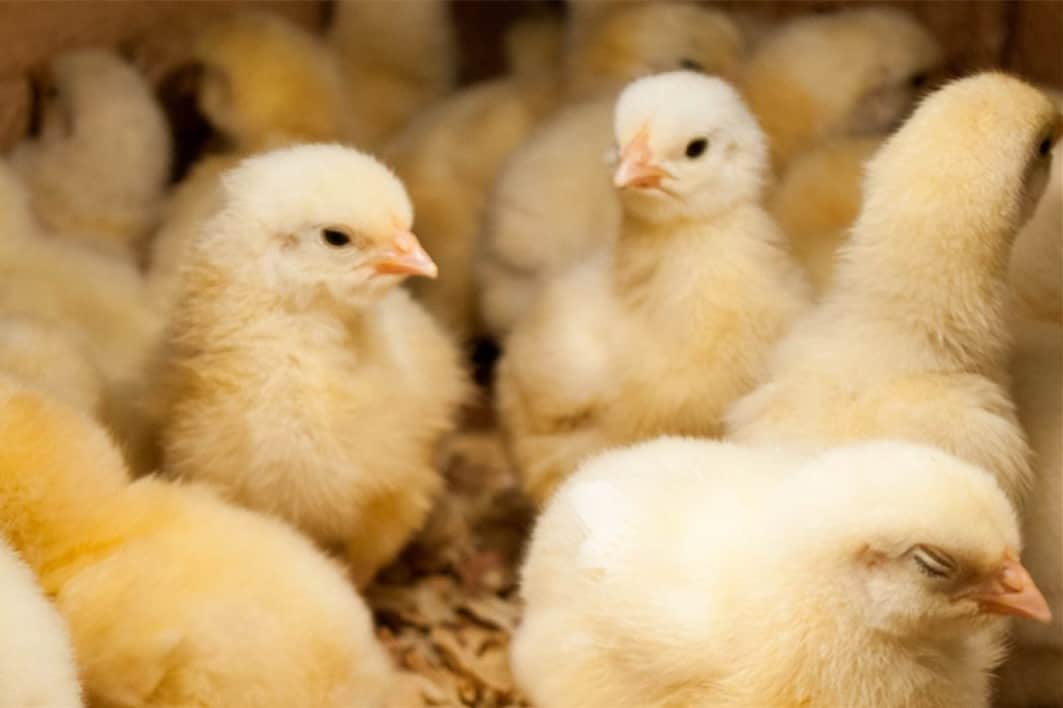When faced with cold weather, grown chickens can adapt to cold temperatures. On the other hand, baby chickens, especially chicks without grown feathers, cannot stand freezing temperatures.
So it is essential to know how cold baby chickens can tolerate if you are planning on taking care of baby chickens.
Can Baby Chickens Tolerate Cold?
Baby Chickens are way more sensitive to cold temperatures than adult chickens because of their smaller size and lack of mature feathers. Baby Chickens from 0 to 8 weeks old still haven’t developed their feathers, so when a baby chicken gets exposed to a cold temperature, they do not have control over their temperature.
What Can Happen if a Baby Chicken Gets Too Cold?
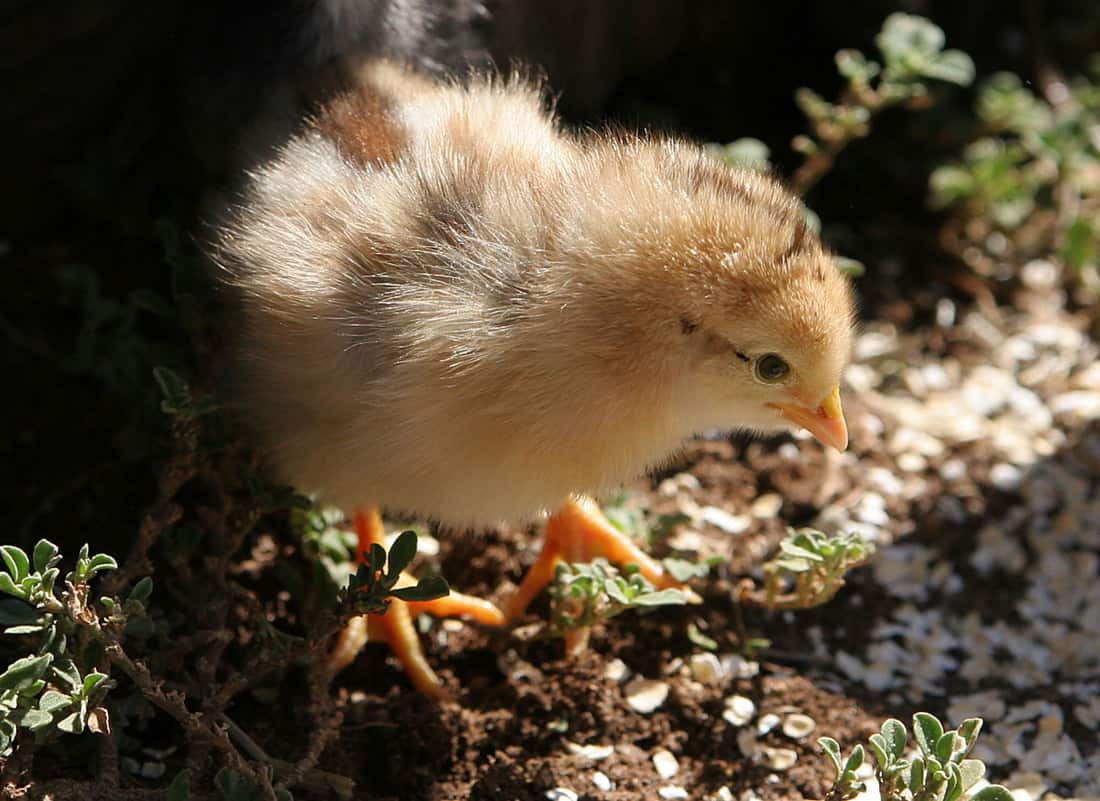
Baby Chickens can freeze to death, or they will grow unhealthy when they get exposed to too much cold. You will know that the baby chickens are cold when they start to pile themselves in the corners for them to keep warm and can cause death by smothering each other.
You should start worrying if these symptoms are showing to your baby chickens:
- They are wobbly
- Weak
- Unable to perch
What is the best temperature for Baby Chickens?
The best temperature for baby chickens depends on their age and how well their feathers are.
The rule of thumb says when the baby chickens hatch, you should start to an environmental temperature between 95 to 100 degrees Fahrenheit or 35 to 37.8 degrees Celsius. Then reduce the temperature by 5 degrees weekly while the baby chickens grow.
The best temperature that a baby chicken can tolerate is between the degree of 50 and 70 Fahrenheit. So it is important to remember that baby chickens can’t tolerate under 50 degrees Fahrenheit, especially if they are under 6 to 8 weeks old.
If you want to understand more about the best temperature for baby chickens, watch this video on how to manage the temperature of baby chicks:
Can a Mother Hen Provide Warmth For Her Baby Chicken?
Baby chickens with their mother beside them can survive cold temperatures for a short period and venture for water and food, then quickly return to the mother hen that provides body heat to keep the baby chicken warm.
Baby Chicken Age Temperature Chart
The exact and accurate temperatures depend on the baby chicken. The younger the chickens, the higher the temperature. Here’s a detailed chart to help you determine the appropriate temperature for baby chickens of various ages:
| CHICKEN AGE | TEMPERATURE IN FAHRENHEIT AND CELSIUS | ADDITIONAL TIPS |
| 0 to 7 Days | 95 degrees Fahrenheit or 35 degrees Celsius
|
Make sure that your baby chicken stays inside their coop always for their body temperature to maintain.
|
| 14 days or 2 weeks | 90 degrees Fahrenheit or 32 degrees Celsius
|
During this age, baby chickens are active. You must remember to secure the lamp to prevent the baby chickens from bumping and being burnt because of the light.
|
| 21 days or 3 weeks | 85 degrees Fahrenheit or 30 degrees Celsius
|
Your baby chickens can now go outside when the weather is warm and pleasant.
|
| 28 days or 4 weeks | 80 degrees Fahrenheit or 27 degrees Celsius
|
You can have your baby chicken have fun outside. The weather must not be cold or rainy.
|
| 6 weeks | 70 degrees Fahrenheit or 21 degrees Celsius
|
You can have your baby chicken have fun outside. The weather must not be cold or rainy.
|
| 6 weeks and above | Baby Chickens can now tolerate cold temperatures during this age | Since the baby chickens have their feathers fully grown, they can now enjoy handling temperatures as low as 1 degree Celsius.
|
Depending on your chicken breed, this chart does not differ much from others. You must use the mother hen or heat lamps to create a warm environment for your baby chickens.
What Else Do Baby Chickens Need To Keep Them Warm?
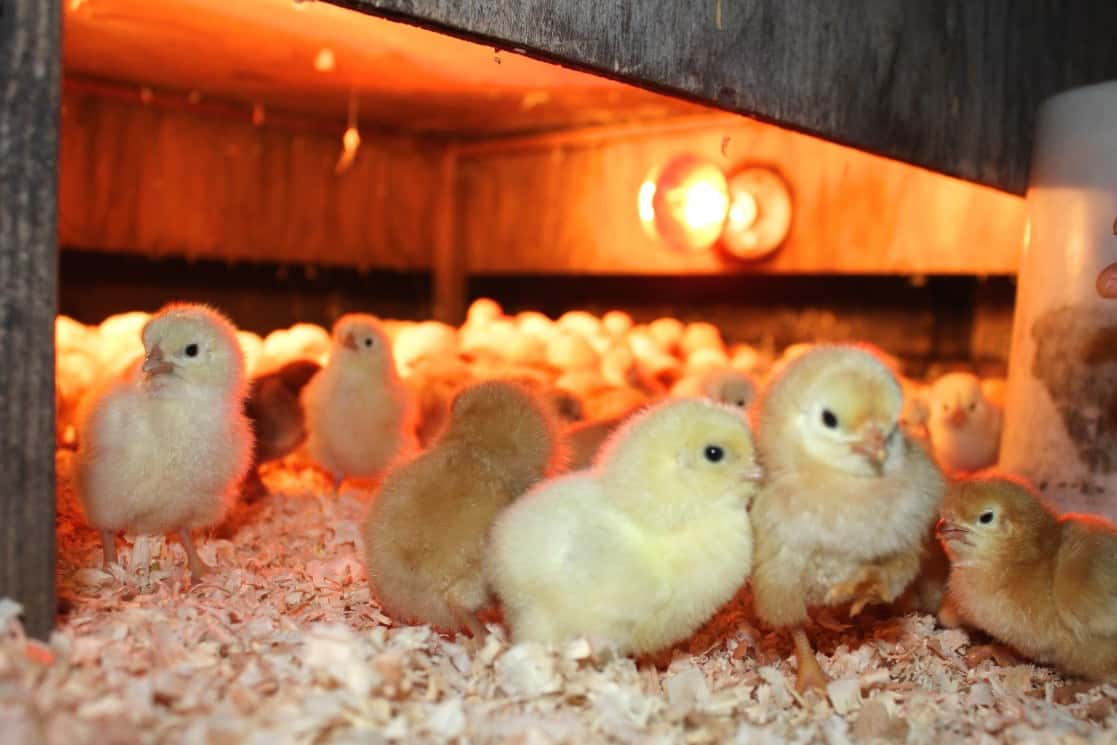
Since we’re discussing caring for baby chicks, here are some other things you should consider to keep them warm:
- Beddings – Bedding is one of the essential things to add additional warmth to baby chicks and make their place clean and friendly. It is made mainly from shredded materials like straw, paper, and pine shavings that are safe for baby chickens.
- Food & Water – It is essential to understand that baby chicks need water and food, even though they can survive on their yolk sac for a day.
Aside from these things, you must ensure that the baby chickens have enough space to live and fit in.
6 Tips on How to Keep Your Baby Chicken Warm
When winter is coming or the temperature outside drops, here are some tips that can help you warm your baby chicken:
- Providing a heat source such as a heat lamp, ceramic heater, or brooder is essential.
- Fill the coop of your baby chicken with an extra layer of bedding for insulation.
- You can use a heated perch so they can stay warm.
- Give extra food to give them the energy to produce body heat.
- Give the baby chicks environmental enrichment or scratch grain to keep them active.
- You can use water heaters to prevent the water from freezing.
Your everyday chores should be checking them most of the day, especially in the evening. You will know they are not cold if you see the baby chickens spreading around the coop, eating normally, and being active.
If you see them staying close to each other and close to the heat source, your coop is too cold for them!
Can a Baby Chicken Die From Overheating?
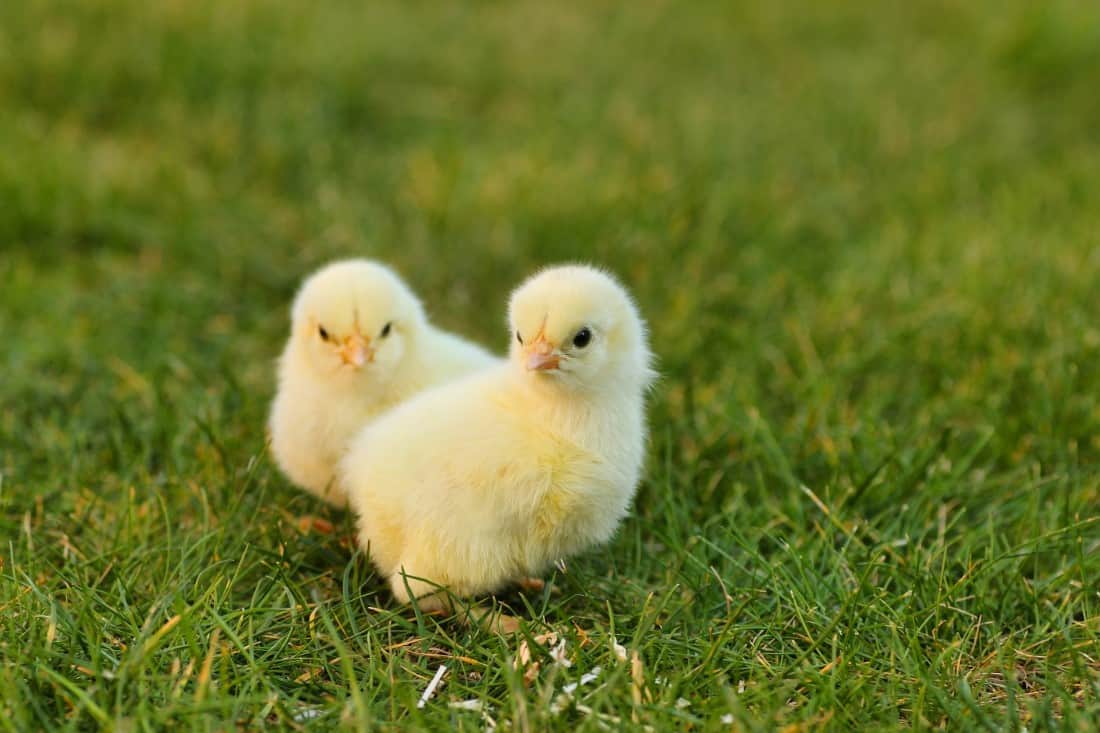
Since you now know the answer to the question, “How cold can baby chicks tolerate?” The next thing you should know is whether a baby chicken can die from overheating.
Baby chickens can die from overheating as they can die from freezing to death. Temperatures above 85 degrees Fahrenheit can cause your baby chickens to overheat, resulting in stress, heatstroke, or, in the worst-case scenario, death.
Since baby chickens do not have enough sweat glands, unlike adult chickens, they do not know how to control their body temperature, causing them to attempt to regulate their body temperature.
When baby chickens feel hot, they will start to eat less, so their bodies will stop overheating, which can cause illness.
6 Important Things to avoid your Baby Chickens from Overheating
Fortunately, some chicken owners have devised ways to prevent baby chicks from overheating. You can remember these tips for your baby chickens to conquer too much heat.
Your baby chicken must have water
Water should be accessible always inside the baby chicken’s coop. You can place the water in a cool place, under a shade, or add some ice cubes so the water will be cold a little longer.
Give your baby chicken a frozen treat
If you are unaware, baby chickens also love to eat frozen treats. To keep your baby chicks cool, consider giving them treats just like frozen vegetables and fruits.
It would be best if you increased the airflow
Airflow can improve circulation in your coop. Your baby chicken can experience overheating if there is insufficient airflow inside the cooper. You can open the window to increase the air or try investing in a fan and use it further.
Give your baby chicken an extra shade
Installing an umbrella in your place will provide extra shade for your baby chickens. The shade will stop the sun from making the ground too hot and direct its sunlight. This will allow the baby chicks not to experience direct sunlight that would cause overheating.
Do not overfeed your baby chickens
Baby chickens can experience overheating if you feed them too much. So giving them an exact quantity of food would benefit them, and they will not experience heatstroke.
Keep monitoring your baby chicken’s temperature
Most owners cannot distinguish if their baby chicken is experiencing overheating or feeling very hot. Here are some signs that you must keep in mind if the baby chick is overheating:
- Excessive Panting
- Lethargic
- Having pale combs
- Having pale wattles
So it is vital to track and monitor your baby chicken so that you know if they are showing signs of having too much heat.
Summary
How much cold can baby chicks tolerate? The answer is none since baby chickens cannot handle freezing temperatures.
Remember that temperatures that are cold can cause death to your baby chicks. You must keep the coop cold free to prevent the baby chickens from dying.
In conclusion, it’s vital to maintain the right temperature for chicks to survive as they cannot tolerate extreme cold unless they are mature enough to withstand it.
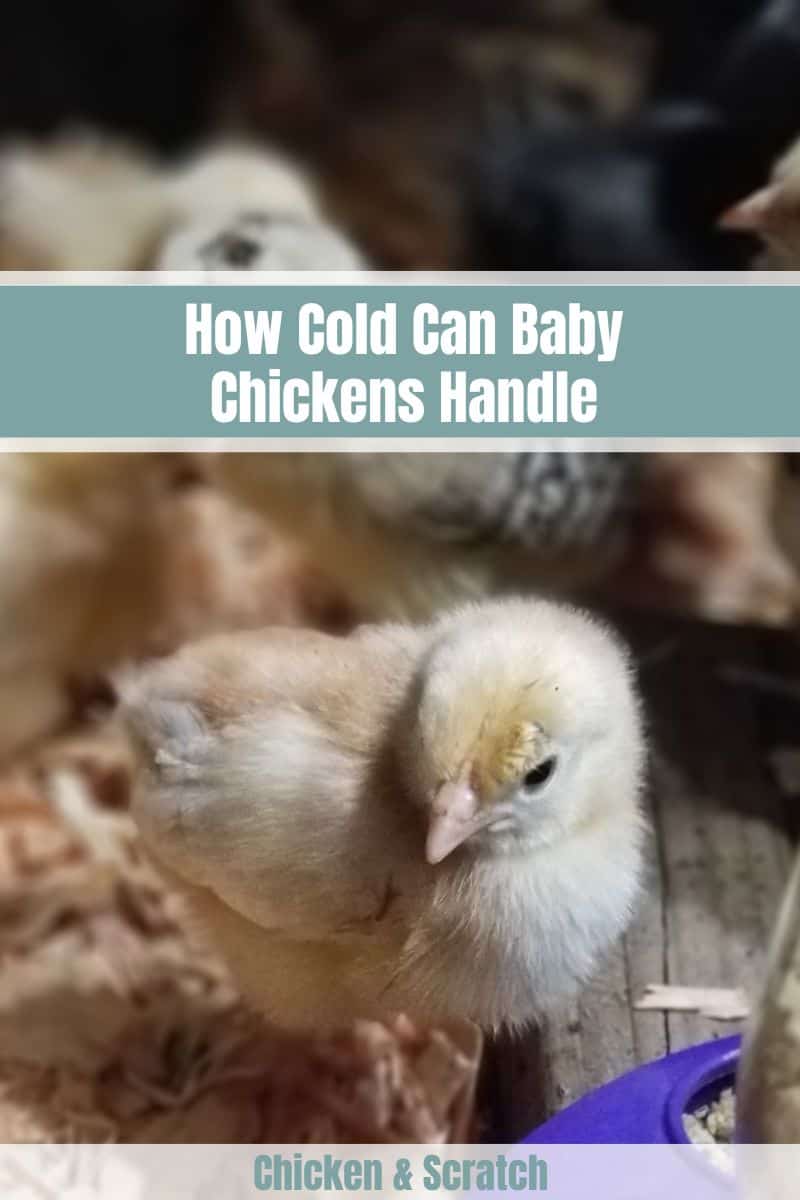

Joseph Hudson has been raising chickens for over 15 years. In 2018, he completed the Agriculture & Natural Resources program at Mt. San Antonio College. He currently raises over 1400 chickens on his 7.5-hectare farm. He keeps sharing his experience on raising healthy and happy chickens on Chicken Scratch The Foundry.
